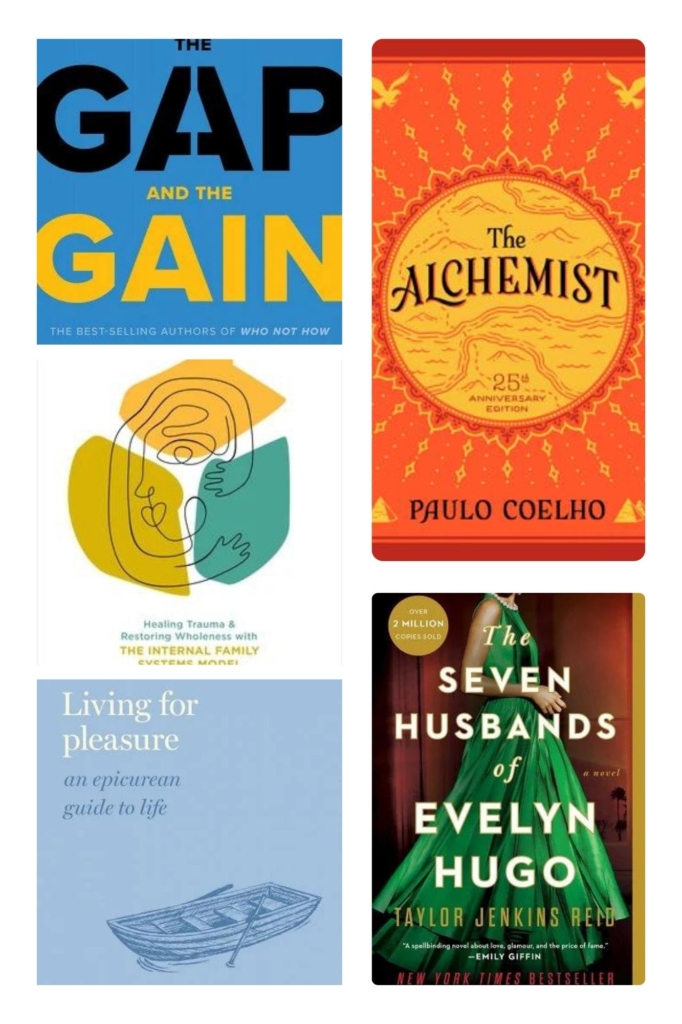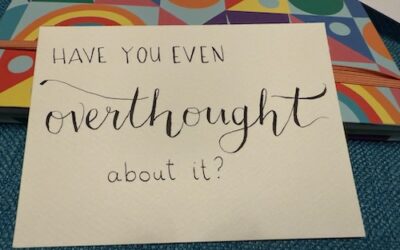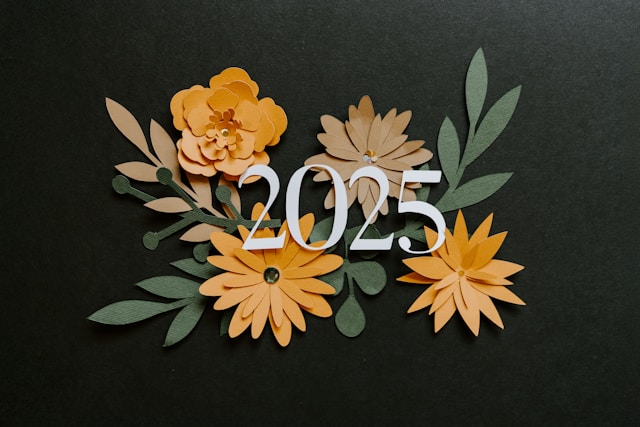
Every year I reflect on the books I read and how they influenced my thinking in various ways. This year, as I look at my list, I’m more struck by the books that I started and haven’t finished (yet).
So, in addition to sharing the top five books I read and how they influenced my thinking, I’ll also share a few of the books that I started, explain why I didn’t finish them, and predict whether I’ll ever finish them. Let’s get to it.
My Hot 5 Books
First, here are the top five books that left an impression on me this year. 2023 was the first full year I went all in on using Audible, so I listened to a lot of books. I expect that I’ll listen to at least one or two more on my annual road trip to Michigan in December. Nothing feels more productive than plowing through a whole book while driving for 12 hours through six states.
1. The Alchemist
What can I say about The Alchemist that hasn’t already been said dozens of times? I’ve known about this book for at least 20 years and finally got around to reading it. It is a beautiful tale of self-discovery and a good reminder that the best gifts come when we least expect them, from the most unexpected sources, and in forms that we never would have imagined. I was inspired to read it when a ghostwriting client said that she thought the universe was conspiring to bring us together to write her book (hey universe, more clients like this please).
Reading this book helped me to appreciate the simpler things. It kept me grounded through times when I was approaching serious burnout and wanted to raze my business to the ground. Walking while listening to The Alchemist, I had the most comforting feeling that everything was going to be okay.
2. Living for Pleasure: An Epicurean Guide to Life
A friend of mine from graduate school, Emily A. Austin, penned Living for Pleasure and another friend of mine from graduate school told me about the book. I read most of it while I was lying on a beach in Puerto Rico, so I was definitely primed to think about living for pleasure.
This book looks at a simple formula for happiness and well-being that comes from the Ancient Greek Philosopher, Epicurus. All you have to do is pursue pleasure without causing yourself any anxiety. Easier said than done, for sure. But this book made me think very differently about my own philosophy of happiness. I’ve always thought of myself as more of a Stoic. Now I’m coming around to the idea that pleasure pursued with care can lead to a really good life.
Thanks, Emily, for the dip back into philosophical thinking without having to wade through all the jargon and dense sentences.
3. The Seven Husbands of Evelyn Hugo
This was a fun read. I don’t read a lot of fiction, but I do enjoy a really good novel. The Seven Husbands of Evelyn Hugo is about how Monique Grant, a relatively unknown, starving magazine reporter living in New York City, gets selected by an aging Hollywood movie icon to write her biography. You know I’m a sucker for any story about a ghostwriter.
Monique is summoned to Evelyn’s luxury apartment under the guise of doing a feature story for the magazine Monique works for. But when she arrives, she discovers that Evelyn has different plans. Evelyn shares her life story with Monique for the first time. From making her way to Los Angeles as a teenager in the 1950s to leaving show business in the ‘80s and each of her seven husbands along the way, Evelyn recounts a tale full of drama, unexpected friendship, and forbidden love. As their work together nears an end, Monique discovers that their lives intersect in tragic and irreversible ways.
Listening to this tale of a fictional movie star leaving her legacy and a young writer finding her way, I thought a lot about the complexities of the human psyche. Both Evelyn and Monique are awkward in their own ways. As they dance around each other’s feelings throughout the book, there were many points where I wanted to shake them both. Only the most well-written books invoke that kind of emotion in me.
4. No Bad Parts: Healing Trauma and Restoring Wholeness with the Internal Family Systems Model
I’ve been spending a bit of time exploring trauma this year. My yoga practice is “trauma-informed” and though I am very fortunate to have never experienced the kind of deep trauma many sadly live with daily, I do think that to be human is to experience trauma. I’ve been sitting with this notion, untangling my own shame responses, and getting to know my parts.
No Bad Parts certainly has played a big role in that exploration. This is another book I listened to on my walks. I’d like to get a hard copy, so I can do some of the exercises for mapping parts that Richard Swartz shares in the book. I resonate with the Internal Family Systems (IFS) Model, and I can see why this approach has been effective for healing trauma, addiction, and depression.
IFS is a paradigm-shifting model in psychology and I’m sure, as with all new models, there are criticisms out there. I may go looking for those criticisms as I dig deeper. This is one rabbit hole I expect to continue going down in the years to come.
5. The Gap and the Gain: The High Achievers’ Guide to Happiness, Confidence, and Success
I usually read the most popular business books in any given year, but nothing on the list really caught my attention this year. For a book club selection, I read The Gap and the Gain by Dan Sullivan and Benjamin Hardy, which actually came out in 2021.
The main idea here is that unsuccessful people focus on “the gap,” while successful people focus on “the gain.” As an ambitious person, I do find myself comparing where I am today to where I wish I were or where I am heading. That’s me looking at the gap. However, Sullivan and Hardy argue that I’d be happier and more successful if I compared where I am today to where I was when I first started.
After reading this book, I’ve been thinking a lot about the comparison game. We hear all the time that we shouldn’t compare ourselves to others. But there just aren’t a lot of ways to measure progress beyond comparing ourselves in one way or another. I think the key is to compare ourselves on the metrics that matter and the metrics that are realistic. It’s not always easy to know what those are, but I don’t think it’s as simple as looking at the gain instead of the gap.
I appreciated this books for helping me think about all the ways I’m making progress and reminding me to celebrate even the small wins this year.
Books I Started But Didn’t Cross the Finish Line
Life’s too short to read bad books, but I don’t always stop reading a book because it’s “bad.” Sometimes I get what I need from reading only part of the book. Other times, my mood isn’t quite right, so I need to come back to a book a few times before I can get into it.
1. The Body Keeps the Score: Brain, Mind, and Body in the Healing of Trauma
I’ve thought about reading The Body Keeps the Score many times and finally picked it up for the first time this year. It’s a psychologically heavy book, so I’m taking it slow. I have a feeling I’ll return to it many times and read it in chunks, perhaps out of order. So far, I’ve read parts one and two of five. It is dense and full of passages that deserve deep reflection, like this one:
“If we look beyond the list of specific symptoms that entail formal psychiatric diagnoses, we find that almost all mental suffering involves either trouble in creating workable and satisfying relationships or difficulties in regulating arousal (as in the case of habitually becoming enraged shut down over excited or disorganized). Usually it’s a combination of both. The standard medical focus on trying to discover the right drug to treat a particular ‘disorder’ tends to distract us from grappling with how our problems interfere with our functioning as members of our tribe.”
It’s also like a good coaching or therapy session, holding up a mirror to the self and asking you to consider thoughts that can be uncomfortable. I get overwhelmed quickly in these situations, so I’m giving myself grace and space to put this book down whenever I need to. To be continued…
2. Life with Picasso
Life with Picasso is an interesting memoir written by Françoise Gilot (with Carlton Lake), who had a 10-year romantic relationship with Pablo Picasso when she was in her early 20s. It’s a story about Picasso—the man, the artist, the sexist abuser—at the height of his fame, but more than that it’s a portrait of a talented, intelligent, and courageous young woman making a way for herself and her own successful career as an artist.
I appreciate the renegade spirit with which this book was written. When it first came out, in 1961, Picasso launched three lawsuits trying to block its publication—and 40 French intellectuals signed a manifesto asking that it be banned. I’m glad that these challenges failed.
I started listening to this book on Audible and I’m afraid the detailed descriptions of the art were lost on me. The novel is a lovely work of art history and art criticism, but I found it difficult to listen to and really hear. Perhaps I am the wrong audience. Perhaps I would enjoy it more listening for long stretches of time, rather than 30 minutes here or there. This review makes me think I should give it another chance.
3. Masters of Scale: Surprising Truths from the World’s Most Successful Entrepreneurs
I picked up Masters of Scale at the recommendation of a friend who’s also a business owner. Reid Hoffman, founder of LinkedIn, takes readers behind the scenes in Silicon Valley, sitting down to interview some of the most well-known visionary founders and leaders about their most surprising strategies.
This is another book I started listening to on Audible and if you do pick up this book, I recommend listening to it because before it was a book, Masters of Scale was (and still is) a podcast. The audio version includes highlights from the interviews in the leaders’ own words. It’s kind of cool, I suppose, to hear them telling their stories.
There are several reasons I didn’t finish this one:
- I’m not often impressed with books that promise to “distill the secrets behind the most extraordinary success stories of our times” or similar promises.
- I prefer the podcast format for interviews, rather than business books written in this style. I’ve never listened to the podcast, but I wonder if I’d enjoy that more than the book.
- I wasn’t actually surprised by the truths being shared.
I think my new rule for business books will be to read those that answer a specific question I have about my own business. As much as it helped me to read more general business advice when I started my business, it’s less useful to me now. I prefer to make my own mistakes and learn from them.
2023 was really all about writing, rather than reading books for me. In addition to writing books for my clients, I wrote my own business book this year. Look for Unwritten: The Big Idea Expert’s Guide to Not Overthinking Your Business Book to be released in August 2024.
The complete list of books I read in 2023:
- The Alchemist by Paulo Coelho
- Living for Pleasure by Emily A. Austin
- The Seven Husbands of Evelyn Hugo by Taylor Jenkins Reid
- No Bad Parts by Richard Swartz
- The Gap and the Gain by Dan Sullivan and Benjamin Hardy
- My Brilliant Friend by Elena Ferrante
- The Story of a New Name by Elena Ferrante
- Fault Lines by Emily Itami
- Why We’re Polarized by Ezra Klein
- For Success Sake! by Christina Langdon
- I Didn’t Do the Thing Today by Madeleine Dore
- The Boldly Inclusive Leader by Minette Norman
- On Writing by Stephen King
- Bird By Bird by Anne Lamott
- Your Business Your Book by Ginny Carter
- Publish Your Purpose by Jenn T. Grace
- Greenlights by Matthew McConaughey (This was my second time through. I listened to it this year after reading on Kindle last year)
- The Gospel of Wellness by Rina Raphael
- Together by Vivek H. Murthy
- Earthing by Clinton Ober et al
- Atlas of the Heart by Brené Brown



